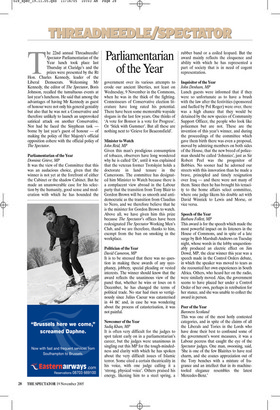T he 22nd annual Threadneedle/ Spectator Parliamentarian of the Year lunch
took place last Thursday at Claridge’s and the prizes were presented by the Rt Hon. Charles Kennedy, leader of the Liberal Democrats. Welcoming Mr Kennedy, the editor of The Spectator, Boris Johnson, recalled the tumultuous events at last year’s luncheon. He said that among the advantages of having Mr Kennedy as guest of honour were not only his general geniality but also that he was not a Conservative and therefore unlikely to launch an unprovoked satirical attack on another Conservative. Nor had he faced the Sisyphean task — borne by last year’s guest of honour — of making the policy of Her Majesty’s official opposition cohere with the official policy of The Spectator.
Parliamentarian of the Year Dominic Grieve, MP
It was the view of the Committee that this was an audacious choice, given that the winner is not yet at the forefront of either the Cabinet or the shadow Cabinet. But he made an unanswerable case for his selection by the humanity, good sense and moderation with which he has hounded the government over its various attempts to erode our ancient liberties, not least on Wednesday, 9 November in the Commons, when he was in the thick of the fighting. Connoisseurs of Conservative election literature have long rated his potential. There have been some memorable wayside slogans in the last few years. One thinks of ‘A vote for Bonsor is a vote for Progress’. Or ‘Stick with Gummer’. But all these are nothing next to ‘Grieve for Beaconsfield’.
Minister to Watch John Reid, MP
Given this man’s prodigious consumption of tobacco, observers have long wondered why he is called ‘Dr’, until it was explained that the veteran former Trotskyist holds a doctorate in land tenure in the Cameroons. The committee has designated him Minister to Watch because there is a complacent view abroad in the Labour party that the transition from Tony Blair to Gordon Brown will be as smooth and antidemocratic as the transition from Claudius to Nero, and we therefore believe that he is the minister for Gordon Brown to watch. Above all, we have given him this prize because The Spectator’s offices have been redesignated The Spectator Working Men’s Club, and we are therefore, thanks to him, exempt from the ban on smoking in the workplace.
Politician of the Year David Cameron, MP
It is to be stressed that there was no question in making these awards of any sycophancy, jobbery, special pleading or vested interests. The winner should know that the award reflects the unanimous view of the panel that, whether he wins or loses on 6 December, he has changed the terms of political trade. No star had risen so vertiginously since Julius Caesar was catasterised in 44 BC and, in case he was wondering about the process of catasterisation, it was not painful.
Newcomer of the Year Sadiq Khan, MP
It is often very difficult for the judges to spot talent early on in a parliamentarian’s career, but the judges were unanimous in singling out this MP for the tough-mindedness and clarity with which he has spoken about the very difficult issues of Islamic terror. Some cited a certain theatricality in his voice, with one judge calling it a ‘strong, physical voice’. Others praised his energy, likening him to a steel spring, a rubber band or a coiled leopard. But the award mainly reflects the eloquence and ability with which he has represented a part of society that is in need of cogent representation.
Inquisitor of the Year John Denham, MP
Lunch guests were informed that if they were so unfortunate as to have a brush with the law after the festivities (sponsored and fuelled by Pol Roger) were over, there was a high chance that they would be detained by the new species of Community Support Officer, the people who look like policemen but are not. These are the invention of this year’s winner, and during the proceedings of the committee which gave them birth there was even a proposal, moved by admiring members on both sides of the House, that the new breed of policeman should be called ‘Johnnies’, just as Sir Robert Peel was the progenitor of Bobbies. No sooner had he adorned our streets with this innovation than he made a brave, principled and timely resignation over Iraq — and there were not many of them. Since then he has brought his tenacity to the home affairs select committee, where one judge likens his double act with David Winnick to Lewis and Morse, or vice versa.
Speech of the Year Barbara Follett, MP
This award is for the speech which made the most powerful impact on its listeners in the House of Commons, and in spite of a late surge by Bob Marshall-Andrews on Tuesday night, whose words in the lobby unquestionably produced an electric effect on Jim Dowd, MP, the clear winner this year was a speech made in the Control Orders debate, in which the speaker was moved to tears as she recounted her own experiences in South Africa. Others, who heard her on the radio, were similarly moved. Alas, the government seems to have placed her under a Control Order of her own, perhaps in retribution for her stance, and she was unable to collect the award in person.
Peer of the Year Baroness Scotland
This was one of the most hotly contested categories, and in spite of the claims of all the Liberals and Tories in the Lords who have done their best to confound some of the government’s worst measures, it was a Labour peeress that caught the eye of the Spectator judges. One man, swooning, said, ‘She is one of the few Blairites to have real charm, and she coaxes appreciation out of the Tory benches with a mixture of fragrance and an intellect that in its machinetooled elegance resembles the latest Mercedes-Benz.’

























































 Previous page
Previous page